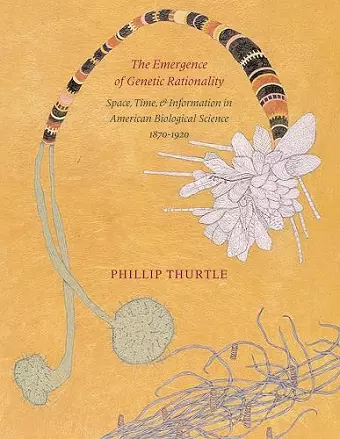The Emergence of Genetic Rationality
Space, Time, and Information in American Biological Science, 1870-1920
Format:Hardback
Publisher:University of Washington Press
Published:20th Dec '07
Currently unavailable, and unfortunately no date known when it will be back
This hardback is available in another edition too:
- Paperback£27.99(9780295987507)

The Emergence of Genetic Rationality is a work in historical epistemology, wonderfully rich in contextual detail and structured in masterful dialog with an array of cultural and media theory. Drawing theoretical inspiration from the works of Pierre Bourdieu, Niklas Luhmann, Gilles Deleuze and Merleau-Ponty, among others, Thurtle situates the rise of genetic rationality before labs were experimentally defining genes and traits: in the record-keeping practices and information-processing techniques of nascent modernity of the late nineteenth and early twentieth centuries; in the practices of note-taking, modes of narration, new ways of exchanging goods, and techniques for ordering time, space, and bodies central to managerial capitalism. Thurtle has constructed a brilliant historical work and a philosophical tour de force. -- Tim Lenoir, Duke University A wonderful multi-disciplinary romp through a very crucial transition period in the history of American biology. -- Barbara Kimmelman, Philadelphia University
Explains the technological, economic, cultural and narrative transformations necessary to make genetic thinking possible. This book offers a cultural history that challenges our own ways of organizing knowledge even as it explicates those of an earlier era.
The emergence of genetic science has profoundly shaped how we think about biology. Indeed, it is difficult now to consider nearly any facet of human experience without first considering the gene. But this mode of understanding life is not, of course, transhistorical. Phillip Thurtle takes us back to the moment just before the emergence of genetic rationality at the turn of the twentieth century to explicate the technological, economic, cultural, and even narrative transformations necessary to make genetic thinking possible.
The rise of managerial capitalism brought with it an array of homologous practices, all of which transformed the social fabric. With transformations in political economy and new technologies came new conceptions of biology, and it is in the relationships of social class to breeding practices, of middle managers to biological information processing, and of transportation to experiences of space and time, that we can begin to locate the conditions that made genetic thinking possible, desirable, and seemingly natural.
In describing this historical moment, The Emergence of Genetic Rationality is panoramic in scope, addressing primary texts that range from horse breeding manuals to eugenics treatises, natural history tables to railway surveys, and novels to personal diaries. It draws on the work of figures as diverse as Thorstein Veblen, Jack London, Edith Wharton, William James, and Luther Burbank. The central figure, David Starr Jordan - naturalist, poet, eugenicist, educator - provides the book with a touchstone for deciphering the mode of rationality that genetics superseded.
Building on continental philosophy, media studies, systems theory, and theories of narrative, The Emergence of Genetic Rationality provides an inter-disciplinary contribution to intellectual and scientific history, science studies, and cultural studies. It offers a truly encyclopedic cultural history that challenges our own ways of organizing knowledge even as it explicates those of an earlier era. In a time in which genetic rationality has become our own common sense, this discussion of its emergence reminds us of the interdependence of the tools we use to process information and the conceptions of life they animate.
". . . fascinating and wide-ranging. . . Revealing that challenge [the need to articulate the connections between the emergence and realization of genetic rationality] may be the most lasting contribution of this narrative for the history of genetics."
-- Michael Dietrich * Journal of the History of Biology *"Thurtle's use of other literary figures-Theodore Dreiser and Jack London, in particular-to reflect key features of his argument is strong and inviting."
* American Studies *"This work is an extraordinary writing in its comprehensiveness, conciseness, and interdisciplinary focus. Thurtle presents an intellectually historical journey, weaving cultural, economic, political, social, literary, and artistic forces that shaped thinking and developments related to genetics during this 50-year period. . . . Highly recommended. All undergraduates, graduate students, researchers, and faculty."
* Choice *"An important, novel way to look at the history of genetics. . . . By studying the way time and space are mapped, classified, used, and interpreted by 19-century industrialists and the scientists who received their philanthropic largesse, Thurtle brings out a part of the history of heredity that scientists like myself have tended to ignore. . . .I recommend this book for anyone who likes to see how the interplay between science and society worked in 19th-century biological thought."
* The Quarterly Review of Biology *"Reading Phillip Thurtle's book is an immersive experience and the book should be read from cover to cover. Thurtle. . .explores literary representations of practices of meaning-making, spaces of sense, and modes of being in turn-of-the-century literature. Thurtle uses these devices to profound effect and the power of the book lies in its literary portrayal of the experiences of living and working in and with these cultures and technologies."
* NTM: Zeitschrift fur Geschichte der Wissenschaften,Technik und MedizISBN: 9780295987569
Dimensions: unknown
Weight: 771g
396 pages